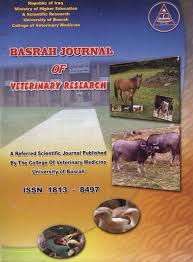Abstract
Newcastle disease (ND) is an endemic viral illness in Iraq and has four types: viscerotropic velogenic, neurotropic velogenic, mesogenic, and lentogenic. The virulence of the virus continuously increases, and it is widely spread in wild and domestic birds. Backyard and poultry farm chickens are mainly affected, causing significant economic losses, as the disease is famous for high morbidity and mortality, which may reach 100%. An outbreak of velogenic ND spread in poultry farms in Sulaymaniyah/Iraq in early 2023, causing high mortality rates. Hence, this study was conducted to isolate and identify the virus and determine its median embryo lethal dose (ELD50) in embryonated chicken eggs (ECEs). Samples were taken from chickens suspected of ND, and NDV identification was made by molecular techniques by amplifying part of the 535-base pair-F gene. The virus was passaged three times in ECEs, and the collected allantoic fluid was used to determine the ELD50. After that, fifty ECEs were used to calculate the ELD50. Allantoic fluid dilutions of 10–107 resulted in the death of all embryos after 2-3 days, with distinctive signs of bleeding and hemorrhage. Dilutions of 108, 109, and 1010 resulted in the death of four, two, and one embryo, respectively, and the PCR test revealed NDV infection. The ELD50 was 6.3 ×108 times the allantoic fluid dilution, showing that the virus was very velogenic and necessitated a strict control plan to prevent the disease\'s further spread.
Keywords
eggs
ELD50
newcastle disease
PCR.
Abstract
مرض نيوكاسل هو مرض فيروسي متوطن في العراق وله أربعة أنواع: نضجي المنشأ، نضجي المنشأ العصبي، ميسوجينيك، ولين المنشأ. وتزداد ضراوة الفيروس بشكل مستمر، وينتشر على نطاق واسع في الطيور البرية والداجنة. ويتأثر بشكل رئيسي دجاج الفناء الخلفي ومزارع الدواجن، مما يسبب خسائر اقتصادية كبيرة، حيث يشتهر المرض بارتفاع معدلات الإصابة والوفيات التي قد تصل إلى 100%. انتشر تفشي مرض ND في مزارع الدواجن في السليمانية / العراق في أوائل عام 2023، مما تسبب في ارتفاع معدلات الوفيات. ومن ثم، أجريت هذه الدراسة لعزل وتحديد الفيروس وتحديد الجرعة المميتة المتوسطة للجنين (ELD50) في أجنة بيض الدجاج (ECEs). تم أخذ عينات من الدجاج المشتبه بإصابته بـمرض نيوكاسل ، وتم التعرف على الفیروس بواسطة التقنيات الجزيئية عن طريق تضخيم جزء من (535 bp) F. تم تمرير الفيروس ثلاث مرات في ECEs، وتم استخدام السائل السقاء الذي تم جمعه لتحديد ELD50. بعد ذلك، تم استخدام خمسين ECEs لحساب ELD50. أدت تخفيفات السائل السقاء بمقدار 10-107 إلى موت جميع الأجنة بعد 2-3 أيام، مع وجود علامات مميزة للنزف والنزف. وأدت التخفيفات 108، و109، و1010 إلى وفاة أربعة، واثنين، وجنين واحد، على التوالي، وكشف اختبار PCR عن الإصابة بفيروس NDV. كان ELD50 6.3 × 108 أضعاف تخفيف السائل السقاء، مما يدل على أن الفيروس كان نشويًا للغاية ويستلزم خطة مراقبة صارمة لمنع انتشار المرض بشكل أكبر.
